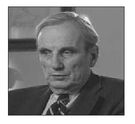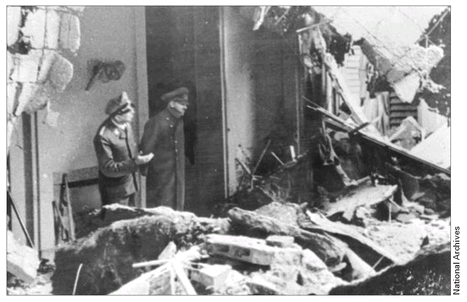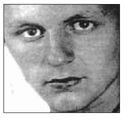War Stories III (40 page)
Authors: Oliver L. North

The German ranks were now filled with old men and boys. Kesselring was plagued by inadequate equipment, insufficient fuel, and deficits in ammunition, weaponsâeven food. Patton, Hodges, and the other Allied commanders rolled right over his western army in every engagement. On 22 March Patch's 7th Army joined with Patton in the Saar and Palatinate regions, and captured a bridgehead on the Rhine at Oppenheim.
By the end of the month, the American 1st, 3rd, and 9th Armies had encircled Germany's nearly ruined industrial heartland. There, Joachim Fest, a seventeen-year-old German conscript, came face-to-face with the Americans.
JOACHIM FEST
Freiburg Gun Battery
Breisgau, Germany
27 March 1945
Breisgau, Germany
27 March 1945

At age fifteen I was drafted into the military, but in May 1944 at age seventeen I transferred into the Luftwaffe. But none of us had any idea of flying anymore. By then, it was much too late for that.
Goering had organized the Luftwaffe into so-called air force infantry divisions, and I was assigned to one of thoseânot knowing if I would be sent to either the Eastern Front or the Western Front. In the east there was the danger of being taken as a Russian prisoner of war. No one wanted thatâbut there was still great danger in the west, due to the Allied air superiority.
I saw action at the famous bridgehead of Remagen. I thought about what would happen if the Americans captured meâhow would I be treated? During the battle we went six days with nothing to eat. So I ate my “last resort” rations, as they were calledâI ate them up.
Off to the left side of my position, about 100 meters away, there was a farm. I was sent there to see if there was any food but as I approached the main building through a narrow passageway for the harvest wagons and mowers, I ran into an American soldier, and he immediately yelled, “Hands up!”
I also said “Hands up!” to him. But then other American soldiers showed and I was taken captive. They led me into a room in this farm and imprisoned there. The next day I was brought to the Rhine River and during the night was brought over Remagen Bridge to the other side of the Rhine. There, several dozen of us were locked inside a school building.
After that we were driven in trucks to a prisoner of war camp near Parisâwhere almost half-million German soldiers had been detained. We
were all together in primitive tents and conditions. My family was in Berlin and for weeks before I was captured I had heard nothing from them. There hadn't been any mailâand of course it had been impossible to phone during the last weeks of the war. So I was very worried about my parents and my sisters.
were all together in primitive tents and conditions. My family was in Berlin and for weeks before I was captured I had heard nothing from them. There hadn't been any mailâand of course it had been impossible to phone during the last weeks of the war. So I was very worried about my parents and my sisters.
When the war was finally over I learned that my father had been taken as a Russian prisoner of war, and my mother and my two sisters were displaced from the area of Berlin where they lived. Within the space of two hours they had to vacate their apartment to accommodate Russian soldiers. They were only permitted to take what one person could carry in one suitcase. They tossed in whatever they could, but then they were suddenly on the street.
In January 1947 I was released from the American prisoner of war camp. My father was one of the lucky few who made it back from being a Russian prisoner of war. He had lost about half his weight. We slowly nursed him back to health and he lived another fifteen years, in spite of his terrible captivity.
When I came back to Germany, I first had to finish my schooling since I had been drafted before finishing school. Half a year later I graduated with the so-called German
Abitur
certificate. And then from that moment on, I was allowed to read anything, say anything, think anything, and publish anything. And suddenly I realized that there is indeed a new freedom that is worth something.
Abitur
certificate. And then from that moment on, I was allowed to read anything, say anything, think anything, and publish anything. And suddenly I realized that there is indeed a new freedom that is worth something.
In 1948, the Americans organized the “Berlin Airlift” to feed the people of the city while the Russians blockaded the trains and roads into Berlin from the west. The airlift has always engendered a feeling of deep thankfulness in me and in my entire generation. We will not forgetâand I know many of my friends feel the same wayâwhat America has done for our freedom.
On 19 March a tormented Adolf Hitler sought refuge in his Berlin underground bunkerâcaught in an undeniable downward spiral, measured only by the continuing injections that his doctor administered regularly.
One of Hitler's own staff members described him as, “a dreadful sight . . . saliva frequently dripped from the corners of his mouth.” Yet, the Führer continued to issue ordersâincluding a directive drafted by Albert Speer, calling for war production to continue until the last possible moment, thenâif factories or facilities were unable to functionâthey should be crippled or destroyed.
One of Hitler's own staff members described him as, “a dreadful sight . . . saliva frequently dripped from the corners of his mouth.” Yet, the Führer continued to issue ordersâincluding a directive drafted by Albert Speer, calling for war production to continue until the last possible moment, thenâif factories or facilities were unable to functionâthey should be crippled or destroyed.
By the evening of 23 March, the 21st Army Group and the U.S. 17th and British 6th Airborne Divisions had followed Patton across the Rhine and the next day, the rest of the U.S. 9th and British 2nd Army had also entered Germany's heartland. The U.S. 7th Army crossed the Rhine further south, at Worms on 26 March, along with the French 1st Army.
But then, on 28 March, Eisenhower, at Marshall's direction, sent word to Stalin that the western Allies would not advance on Berlin. Instead, the British and Americans would proceed along the Efurt-Leipzig-Dresden corridor to split German defenses and then link up with the Red Army. When General Omar Bradley called Patton and told him that Eisenhower did not want him to venture any farther into Germany, it is said that “Old Blood and Guts” had tears in his eyes. By 1 April 1945, the final Red Army drive to Berlin was on.
Â
Hitler shortly before the end of the war.

A disheartened General George Patton turned his army east toward Czechoslovakia, and on 7 April, his troops literally struck gold, uncovering a hoard of Nazi treasureâ$250 million in gold barsâhidden deep inside a salt mine in the town of Merkers. After receiving a tip from local residents, Patton's engineers blasted their way into the salt caverns outside the town and found millions more in priceless works of artâpaintings, jewels, and 8,000 gold barsâalong with more than fifty boxes of gold bullion, gold and silver coins, and
hundreds of bales
of currency from various nations worth hundreds of millions of dollars. It appeared that most of the gold reserves of the German Central Bank had been stored there.
hundreds of bales
of currency from various nations worth hundreds of millions of dollars. It appeared that most of the gold reserves of the German Central Bank had been stored there.
Excitement about the discovery was tempered with a grisly realizationâHitler's SS had also used the mine to hide gold and jewels stolen from Nazi death camp inmatesâincluding dental fillings, wedding rings, and other jewelry and personal effects.
Although the Merkers mine was located in an area designated as a Soviet-controlled zone, Patton ordered the booty to be removed before the Red Army arrived.
The death of Franklin Delano Roosevelt on 12 April did nothing to slow the momentum. The following day, Soviets troops occupied Vienna, Austria, and subdued the last German defenders in Hungary. Though American and British troops paused briefly out of respect to the American president, Russian troops continued their offensive and by 13 April, 2.5 million Red Army soldiers of the 1st and 2nd Belorussian Front and the 1st Ukrainian Front effectively encircled the capital in a ring of massed artillery and mortar fire. Two days later, American and British soldiers overran the Ruhr Valley, capturing 320,000 German troops. The Third Reich was in its death throes.
Hitler marked his fifty-sixth birthday on 19 April 1945 by decorating several Hitler Youth defenders of Berlin for their valor. The next day, the 3rd Infantry Division entered Nuremberg, the seat of Nazi power. American
troops lined up in Adolf Hitlerplatz and ceremoniously raised the Stars and Stripes over a huge Nazi swastika.
troops lined up in Adolf Hitlerplatz and ceremoniously raised the Stars and Stripes over a huge Nazi swastika.
With the end near, Hitler was spending nearly every moment in his bunker beneath the Reich Chancellery with his closest Nazi Party officials. Nonetheless, Heinrich Himmler, one of his most steadfast followers, still managed to slip away long enough to meet in secret with Swedish diplomats in an effort to see if he could negotiate some kind of conditional surrender on the Western Front.
Now, only a select few remained loyal to Hitler. One of them was Eva Braun and another, a Hitler Youth soldier, sixteen-year-old Armin Lehmann, on courier duty, was dodging Russian bullets to deliver messages to and from Hitler's bunker.
CORPORAL ARMIN LEHMANN
Hitler Youthâ
Jungsturm Adolf Hitler
Berlin, Germany
19 April 1945
Jungsturm Adolf Hitler
Berlin, Germany
19 April 1945

When the war started, I volunteered for the mountain
Jungsturm
unit. These were AA units to shoot down enemy bombers. I was fifteen at the time. At Christmas '44 I had the papers at home to report to the pre-military training for mountain soldiers.
Jungsturm
unit. These were AA units to shoot down enemy bombers. I was fifteen at the time. At Christmas '44 I had the papers at home to report to the pre-military training for mountain soldiers.
I reported to my Jungsturm unit of the Hitler Youth, and our commanding officer was an army first lieutenant, who had been wounded and only had one lung left. He said, “I need a courier,” and picked me for the job. That was good news for me, because to a certain extent as a runner you're on your own. You are given a destination; you deliver your dispatch, and get back to the unit. You are mostly responsible to yourself.
I was never afraid of death. But I was afraid of the Russian soldiers. We were told that they slaughter to
sterben Sie einen langsamen Tod
, which means they let you die a painful, slow death.
sterben Sie einen langsamen Tod
, which means they let you die a painful, slow death.
Twice I was given the Iron Cross for bravery, after being wounded, and for getting some of my wounded comrades out of the line of fire. We had encountered a Russian tank. A German
panzerfaust
âlike an American bazookaâwas the only weapon available to me at the time so I knocked out one of the Russian tanks, and completed the mission without any more casualties.
panzerfaust
âlike an American bazookaâwas the only weapon available to me at the time so I knocked out one of the Russian tanks, and completed the mission without any more casualties.
After attending to my wounds they put me on a hospital train, and then later I was sent back to our unit. But my orders changedâI was to go and defend Berlin. The unit was comprised of the students of a Jugen-sturm, and some others from a pre-military training facilityâaltogether about 150 young people.
I was there getting ready when a German-type jeep drove up and a man jumped out right in front of me, and pointed to the medal I had been awarded, and said, “Where did you get the Iron Cross?”
I explained it to him. And then he went to my commander and pointed to me and said, “Are there two more like him? I need three decorated boys to present to the Führer on his birthday.” The celebration was on the nineteenth, but the reception for us was postponed to the twentieth, at five o'clock in the afternoon. We were driven right into the garden of the Chancellery. Hitler was shaking so badly he couldn't even really shake our hand. He had to hold on to his jacket.
When I first saw Hitler seven years earlier, in 1938, he was strong, healthy looking, wearing his Nazi uniform, and his medals from the First World War. He had radiated energy, and people went wild. But when I saw him on April 20, he looked older than my grandfather who was in his seventies. Hitler's birthday was that dayâhe was fifty-six. He also looked smaller, which might have to do with age.
Other books
Year of Being Single by Collins, Fiona
Wish Upon a Tiger: A BBW Weretiger Shifter Romance (Fountain of Love) by Mitchell, A.T.
Savage Summer by Constance O'Banyon
The Darkest Lie by Gena Showalter
People of the Wolf by Gear, Kathleen O'Neal, Gear, W. Michael
The Water Diviner by Andrew Anastasios
A Simple Truth by Ball, Albert
The Rose of Sebastopol by Katharine McMahon
The Garner Files: A Memoir by James Garner
Unwritten Books 1 - Unwritten Girl by James Bow